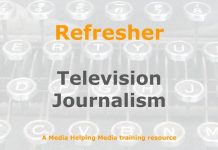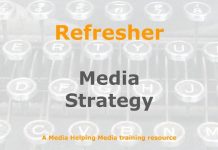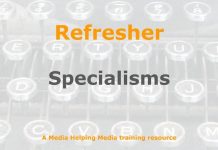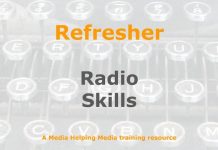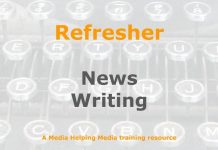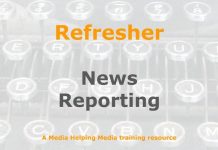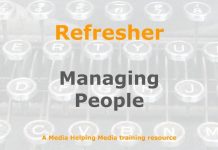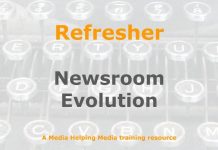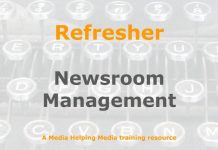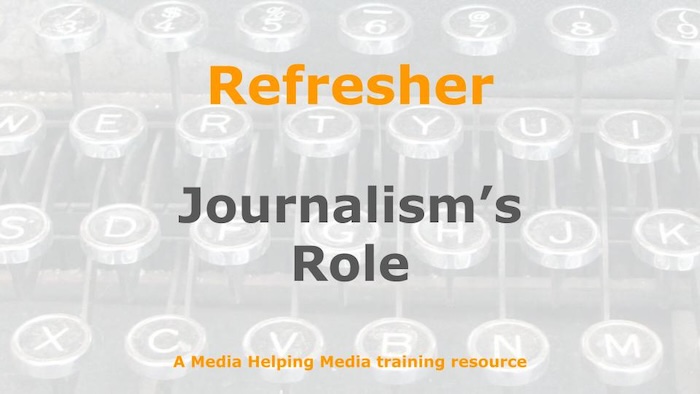 This intensive one-day programme compresses the core content of our six-week module on the fundamental role of journalism in society.
This intensive one-day programme compresses the core content of our six-week module on the fundamental role of journalism in society.
It is designed to re-establish and deepen your understanding of the profession’s democratic function, essential qualities, and core responsibilities, ensuring you are equipped with the critical mindset necessary for impactful reporting in any context.
The refresher revisits the content covered in the six-week module ‘Journalism’s Role’ which you are free to download and adapt for your own purposes.
We recommend that trainers circulate the recommended reading resources listed below and encourage participants to read them before attending this refresher.
Learning objectives
Upon completion of this intensive programme, participants will be able to:
- Define the essential function of journalism and explain its crucial role in supporting democratic processes.
- Identify and cultivate the personal qualities and professional responsibilities required for a career in news.
- Differentiate clearly between straight reporting (fact) and editorial comment (opinion).
- Employ strategic questioning techniques and apply a strong news sense to all newsgathering.
- Master the art of shoe-leather reporting—the foundational, on-the-ground persistence required to verify stories.
Programme schedule, topics, and activities
The day is structured into four core sessions, focusing on the journalist’s public duty, skills, and critical application.
1. The foundation of journalism (09:30 – 11:00)
- Topics: Defining the role and professional identity
- Focus: Exploring how journalism supports democracy, identifying the personal qualities (curiosity, scepticism, accuracy) required for the job, and understanding the different journalistic roles and responsibilities.
- Activity: Group discussion and role reflection. A debate on “Why does journalism matter?” followed by a class brainstorm on the top five qualities of an effective modern journalist.
- Recommended reading resources:
(11:00 – 11:15) Break
2. Acquiring skills and sources (11:15 – 13:00)
- Topics: Success mindset and newsgathering
- Focus: Discussing the commitment journalism demands, the vital importance of separating fact-based news from opinion, and understanding the origins of news, including the impact of citizen journalism.
- Activity: Writing impartiality drill and source analysis. Participants will correct a news story that contains editorialising, followed by a small group task to identify the primary source of three recent news stories.
- Recommended reading resources:
(13:00 – 14:00) Lunch
3. The critical mindset (14:00 – 15:30)
- Topics: News sense and essential questions
- Focus: Developing acute ‘news sense’—the instinct for identifying significant stories—and mastering the critical thinking required to ask the right questions (What, Why, When, How, Where, Who) for comprehensive reporting.
- Activity: Question-writing drill and deconstruction. Using a bland mock scenario, teams will formulate and prioritise the six essential questions to find a sharper angle, followed by critiquing a real news story to determine the most important questions that must have been asked.
- Recommended reading resources:
(15:30 – 15:45) Break
4. Application and persistence (15:45 – 17:00)
- Topics: Reporting on the ground
- Focus: Applying techniques for productive, on-the-ground journalism, emphasising the value of persistence, keen observation, and genuine curiosity in newsgathering, often referred to as ‘shoe-leather reporting.’
- Activity: News hunt and productivity audit. A short ‘walkabout’ reporting challenge in a defined local area to find an underreported story, followed by a personal reflection and group discussion on time management and priorities in the field.
- Recommended reading resources:
Concluding discussion (17:00 – 17:30)
The course concludes with the assertion that the journalist’s role is not static but a perpetual commitment to public service, built upon the bedrock of curiosity, skepticism, and persistence. Your ability to maintain a clear line between fact and opinion, to pursue truth diligently on the ground, and to critically question every angle ensures that you remain a vital pillar of the public’s right to know. This refresher reinforces the fact that the most essential tool of the journalist is not the camera or the computer, but the well-trained, inquisitive mind.
